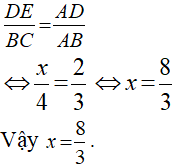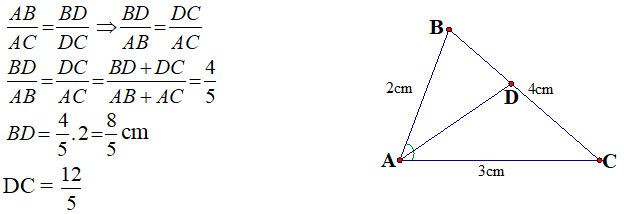Giải các phương trình sau:
a) 4 x − 5 = x + 7 ; b) 10 x − 12 − 3 x = 6 + x ;
c) 5 x − 4 3 = 2 + 3 x 2 d) 7 x − 1 6 + 2 x = 16 − x 5 .
1.Giải các phương trình sau:
a) 2x2 +16 -6 = 4\(\sqrt{x\left(x+8\right)}\)
b) x4 -8x2 + x-2\(\sqrt{x-1}\) + 16=0
2. Gọi x1;x2 là nghiệm phương trình x2 -3x -7 =0. Không giải phương trình tính các giá trị của biểu thức sau:
A = \(\dfrac{1}{x_1-1}+\dfrac{1}{x_2-1}\)
B= \(x^2_1+x_2^2\)
C= |x1 - x2|
D= \(x_1^4+x_2^4\)
E= (3x1 + x2) (3x2 + x1)
2:
\(A=\dfrac{x_2-1+x_1-1}{x_1x_2-\left(x_1+x_2\right)+1}\)
\(=\dfrac{3-2}{-7-3+1}=\dfrac{1}{-9}=\dfrac{-1}{9}\)
B=(x1+x2)^2-2x1x2
=3^2-2*(-7)
=9+14=23
C=căn (x1+x2)^2-4x1x2
=căn 3^2-4*(-7)=căn 9+28=căn 27
D=(x1^2+x2^2)^2-2(x1x2)^2
=23^2-2*(-7)^2
=23^2-2*49=431
D=9x1x2+3(x1^2+x2^2)+x1x2
=10x1x2+3*23
=69+10*(-7)=-1
Giải các phương trình sau:
a,|-5x|+|7-x|=27
b,|3x-1|+|x+4|=21
c,2|3x|-5|x+2|=-7
d,|3x-5|+2=|15-3x|
e,|2x+1|-|5-3x|=2
Bài 1: Giải các phương trình sau:
a) 3(2,2-0,3x)=2,6 + (0,1x-4)
b) 3,6 -0,5 (2x+1) = x - 0,25(22-4x)
Bài 2: Giải các phương phương trình sau:
a) \(\dfrac{3\left(x-3\right)}{4}\)+\(\dfrac{4x-10,5}{4}\)=\(\dfrac{3\left(x+1\right)}{5}\)+6
b) \(\dfrac{2\left(3x+1\right)+1}{4}\)-5=\(\dfrac{2\left(3x-1\right)}{5}\)-\(\dfrac{3x+2}{10}\)
Mik đang cần gấp nha!!❤
Bài 1: Giải các phương trình sau:
a) 3(2,2-0,3x)=2,6 + (0,1x-4)
<=> 6.6 - 0.9x = 2,6 + 0,1x - 4
<=> - 0.9x - 0,1x = -6.6 -1,4
<=> -x = -8
<=> x = 8
Vậy x = 8
b) 3,6 -0,5 (2x+1) = x - 0,25(22-4x)
<=> 3,6 - x - 0,5 = x - 5,5 + x
<=> - x - 3,1 = -5,5
<=> - x = -2.4
<=> x = 2.4
Vậy x = 2.4
Giải các phương trình sau:
a, \(|x^2-x+2|-3x-7=0\)
b, \(|x-1|+|2x+3|=|x|+4\)
a) Ta có: \(\left|x^2-x+2\right|-3x-7=0\)
\(\Leftrightarrow\left|x^2-x+2\right|=3x+7\)
\(\Leftrightarrow x^2-x+2=3x+7\)(Vì \(x^2-x+2>0\forall x\))
\(\Leftrightarrow x^2-x+2-3x-7=0\)
\(\Leftrightarrow x^2-4x-5=0\)
\(\Leftrightarrow x^2-5x+x-5=0\)
\(\Leftrightarrow x\left(x-5\right)+\left(x-5\right)=0\)
\(\Leftrightarrow\left(x-5\right)\left(x+1\right)=0\)
\(\Leftrightarrow\left[{}\begin{matrix}x-5=0\\x+1=0\end{matrix}\right.\Leftrightarrow\left[{}\begin{matrix}x=5\\x=-1\end{matrix}\right.\)
Vậy: S={5;-1}
giải các phương trình sau:
a)(x+2)(x2-2x+4)-x(x2-2)=15
b)x(x-5)(x+5)-(x+2)(x2-2x+4)=3
\(a,=>x^3-2x^2+4x+2x^2-4x+8-x^3+2x-15=0\)
\(< =>2x-7=0< =>x=\dfrac{7}{2}\)
b,\(=>x\left(x^2-25\right)-\left(x+2\right)\left(x^2-2x+4\right)-3=0\)
\(< =>x^3-25x-x^3+2x^2-4x-2x^2+4x-8-3=0\)
\(< =>-25x-11=0\)
\(< =>x=-0,44\)
Bài 1. (3 điểm) Giải các phương trình sau:
a) (3x - 7)(x + 5) = (5 + x)(3 - 2x) 
giúp mình với mai thi rồi![]()
\(a,\left(3x-7\right)\left(x+5\right)=\left(5+x\right)\left(3-2x\right)\)
\(\Leftrightarrow\left(3x-7\right)\left(x+5\right)-\left(x+5\right)\left(3-2x\right)=0\)
\(\Leftrightarrow\left(x+5\right)\left(3x-7-3+2x\right)=0\)
\(\Leftrightarrow\left[{}\begin{matrix}x+5=0\\5x-10=0\end{matrix}\right.\)
\(\Leftrightarrow\left[{}\begin{matrix}x=-5\\x=2\end{matrix}\right.\)
\(b,\dfrac{-x+3}{2}=\dfrac{x-2}{3}\left(MSC=6\right)\)
Suy ra :
\(3\left(-x+3\right)=2\left(x-2\right)\)
\(\Leftrightarrow-3x+9-2x+4=0\)
\(\Leftrightarrow-5x+13=0\)
\(\Leftrightarrow x=\dfrac{13}{5}\)
\(c,\dfrac{x-1}{x-2}+\dfrac{5}{x+2}=\dfrac{12}{x^2-4}+1\)\(\left(dkxd:x\ne\pm2\right)\)
\(\Leftrightarrow\dfrac{\left(x-1\right)\left(x+2\right)+5\left(x-2\right)-12-x^2+4}{x^2-4}=0\)
\(\Leftrightarrow x^2+2x-x-2+5x-10-12-x^2+4=0\)
\(\Leftrightarrow6x-20=0\)
\(\Leftrightarrow x=\dfrac{10}{3}\)\(\left(n\right)\)
Vậy \(S=\left\{\dfrac{10}{3}\right\}\)
a | Áp dụng hệ quả của định lý Ta-lét ta có:  |
b | Ta có:  |
giải các phương trình sau:
a.3(x-2)-10=5(2x + 1)
b.3x + 2=8 -2(x-7)
c.2x-(2+5x)= 4(x + 3)
d.5-(x +8)=3x + 3(x-9)
e.3x - 18 + x= 12-(5x + 3)
a. 3(x-2)-10=5(2x + 1)
<=> 3x - 6 - 10 = 10x + 5
<=> 3x - 10x = 5 + 6 + 10
<=> -7x = 21
<=> x = -3
b. 3x + 2=8 -2(x-7)
<=> 3x + 2 = 8 - 2x + 14
<=> 3x + 2x = 8 + 14 - 2
<=> 5x = 20
<=> x = 4
c. 2x-(2+5x)= 4(x + 3)
<=> 2x - 2 - 5x = 4x + 12
<=> 2x - 5x - 4x = 12 + 2
<=> -7x = 14
<=> x = -2
d. 5-(x +8)=3x + 3(x-9)
<=> 5 - x - 8 = 3x + 3x - 27
<=> -x - 3x - 3x = -27 + 8 - 5
<=> -7x = -24
<=> x = 24/7
e. 3x - 18 + x= 12-(5x + 3)
<=> 3x - 18 + x = 12 - 5x - 3
<=> 3x + x - 5x = 12 - 3 + 18
<=> -x = 27
<=> x = - 27
a. 3(x-2)-10=5(2x + 1)
<=> 3x - 6 - 10 = 10x + 5
<=> 3x - 10x = 5 + 6 + 10
<=> -7x = 21
<=> x = -3
b. 3x + 2=8 -2(x-7)
<=> 3x + 2 = 8 - 2x + 14
<=> 3x + 2x = 8 + 14 - 2
<=> 5x = 20
<=> x = 4
c. 2x-(2+5x)= 4(x + 3)
<=> 2x - 2 - 5x = 4x + 12
<=> 2x - 5x - 4x = 12 + 2
<=> -7x = 14
<=> x = -2
d. 5-(x +8)=3x + 3(x-9)
<=> 5 - x - 8 = 3x + 3x - 27
<=> -x - 3x - 3x = -27 + 8 - 5
<=> -7x = -24
<=> x = 24/7
e. 3x - 18 + x= 12-(5x + 3)
<=> 3x - 18 + x = 12 - 5x - 3
<=> 3x + x - 5x = 12 - 3 + 18
<=> -x = 27
<=> x = - 27
Giải các phương trình sau:
a/ (3x – 2)(4x + 5) = 0
b/ (2,3x – 6,9)(0,1x + 2) = 0
c/ (4x + 2)(x2 + 1) = 0
d/(2x + 7)(x – 5)(5x + 1) = 0
e/ (x – 1)(2x + 7)(x2 + 2) = 0
f/ (3x + 2)(x2 – 1) = (9x2 – 4)(x + 1)
a) \(\left(3x-2\right)\left(4x+5\right)=0\)
\(\Leftrightarrow\left[{}\begin{matrix}3x-2=0\\4x+5=0\end{matrix}\right.\)
\(\Leftrightarrow\left[{}\begin{matrix}x=\dfrac{2}{3}\\x=-\dfrac{5}{4}\end{matrix}\right.\)
Vậy: \(S=\left\{\dfrac{2}{3};-\dfrac{5}{4}\right\}\)
b) \(\left(2,3x-6,9\right)\left(0,1x+2\right)=0\)
\(\Leftrightarrow\left[{}\begin{matrix}2,3x-6,9=0\\0,1x+2=0\end{matrix}\right.\)
\(\Leftrightarrow\left[{}\begin{matrix}x=3\\x=-20\end{matrix}\right.\)
c) \(\left(4x+2\right)\left(x^2+1\right)=0\)
Vì \(x^2+1\ge1>0\forall x\)
\(\Rightarrow4x+2=0\)
\(\Leftrightarrow x=-\dfrac{1}{2}\)
Vậy: \(S=\left\{-\dfrac{1}{2}\right\}\)
d) \(\left(2x+7\right)\left(x-5\right)\left(5x+1\right)=0\)
\(\Leftrightarrow\left[{}\begin{matrix}2x+7=0\\x-5=0\\5x+1=0\end{matrix}\right.\)
\(\Leftrightarrow\left[{}\begin{matrix}x=-\dfrac{7}{2}\\x=5\\x=-\dfrac{1}{5}\end{matrix}\right.\)
Vậy: \(S=\left\{-\dfrac{7}{2};5;-\dfrac{1}{5}\right\}\)
e) \(\left(x-1\right)\left(2x+7\right)\left(x^2+2\right)=0\)
Vì \(x^2+2\ge2>0\forall x\)
\(\Rightarrow\left(x-1\right)\left(2x+7\right)=0\)
\(\Leftrightarrow\left[{}\begin{matrix}x-1=0\\2x+7=0\end{matrix}\right.\)
\(\Leftrightarrow\left[{}\begin{matrix}x=1\\x=-\dfrac{7}{2}\end{matrix}\right.\)
f) \(\left(3x+2\right)\left(x^2-1\right)=\left(9x^2-4\right)\left(x+1\right)\)
\(\Leftrightarrow\left(3x+2\right)\left(x-1\right)\left(x+1\right)-\left(3x-2\right)\left(3x+2\right)\left(x+1\right)=0\)
\(\Leftrightarrow\left[\left(3x+2\right)\left(x+1\right)\right].\left(x-1-3x+2\right)=0\)
\(\Leftrightarrow\left(3x^2+5x+2\right)\left(-2x+1\right)=0\)
\(\Leftrightarrow\left(3x^2+3x+2x+2\right)\left(-2x+1\right)=0\)
\(\Leftrightarrow\left[3x\left(x+1\right)+2\left(x+1\right)\right]\left(-2x+1\right)=0\)
\(\Leftrightarrow\left(x+1\right)\left(3x+2\right)\left(-2x+1\right)=0\)
\(\Leftrightarrow\left[{}\begin{matrix}x+1=0\\3x+2=0\\-2x+1=0\end{matrix}\right.\)
\(\Leftrightarrow\left[{}\begin{matrix}x=-1\\x=-\dfrac{2}{3}\\x=\dfrac{1}{2}\end{matrix}\right.\)
Vậy: \(S=\left\{-1;-\dfrac{2}{3};\dfrac{1}{2}\right\}\)
Giải các hệ phương trình sau:
a.{1/x - 1/y = 1
{2/x - 3/y = 5
b.{15/x - 7/y = 9
{4/x + 9/y = 35
\(a,\Leftrightarrow\left\{{}\begin{matrix}\dfrac{2}{x}-\dfrac{2}{y}=2\\\dfrac{2}{x}-\dfrac{3}{y}=5\end{matrix}\right.\left(x,y\ne0\right)\Leftrightarrow\left\{{}\begin{matrix}-\dfrac{5}{y}=3\\\dfrac{2}{x}-\dfrac{3}{y}=5\end{matrix}\right.\Leftrightarrow\left\{{}\begin{matrix}y=-\dfrac{5}{3}\\\dfrac{2}{x}+\dfrac{9}{5}=5\end{matrix}\right.\\ \Leftrightarrow\left\{{}\begin{matrix}x=\dfrac{5}{8}\\y=-\dfrac{5}{3}\end{matrix}\right.\)
\(b,\Leftrightarrow\left\{{}\begin{matrix}\dfrac{60}{x}-\dfrac{28}{y}=36\\\dfrac{60}{x}-\dfrac{135}{y}=525\end{matrix}\right.\left(x,y\ne0\right)\Leftrightarrow\left\{{}\begin{matrix}\dfrac{4}{x}+\dfrac{9}{y}=35\\-\dfrac{163}{y}=489\end{matrix}\right.\Leftrightarrow\left\{{}\begin{matrix}\dfrac{4}{x}-27=35\\y=-\dfrac{1}{3}\end{matrix}\right.\\ \Leftrightarrow\left\{{}\begin{matrix}x=\dfrac{2}{31}\\y=-\dfrac{1}{3}\end{matrix}\right.\)
a: Ta có: \(\left\{{}\begin{matrix}\dfrac{1}{x}-\dfrac{1}{y}=1\\\dfrac{2}{x}-\dfrac{3}{y}=5\end{matrix}\right.\)
\(\Leftrightarrow\left\{{}\begin{matrix}\dfrac{2}{x}-\dfrac{2}{y}=2\\\dfrac{2}{x}-\dfrac{3}{y}=5\end{matrix}\right.\Leftrightarrow\left\{{}\begin{matrix}\dfrac{1}{y}=-3\\\dfrac{1}{x}-\dfrac{1}{y}=1\end{matrix}\right.\Leftrightarrow\left\{{}\begin{matrix}y=\dfrac{-1}{3}\\\dfrac{1}{x}=1+\dfrac{1}{y}=1+\left(-3\right)=-2\end{matrix}\right.\)
\(\Leftrightarrow\left\{{}\begin{matrix}y=-\dfrac{1}{3}\\x=\dfrac{-1}{2}\end{matrix}\right.\)
giải các phương trình sau:
a. x2-25=8(5-x)
b.x-2/ x+2 - 2(x-11)/x2-4 =3/x-2
a.\(x^2-25=8\left(5-x\right)\)
\(\Leftrightarrow\left(x-5\right)\left(x+5\right)-8\left(5-x\right)=0\)
\(\Leftrightarrow\left(x-5\right)\left(x+5\right)+8\left(x-5\right)=0\)
\(\Leftrightarrow\left(x-5\right)\left(x+13\right)=0\)
\(\Leftrightarrow\left[{}\begin{matrix}x=5\\x=-13\end{matrix}\right.\)
b.\(\dfrac{x-2}{x+2}-\dfrac{2\left(x-11\right)}{x^2-4}=\dfrac{3}{x-2}\) ; \(ĐK:x\ne\pm2\)
\(\Leftrightarrow\dfrac{\left(x-2\right)\left(x-2\right)-2\left(x-11\right)}{\left(x-2\right)\left(x+2\right)}=\dfrac{3\left(x+2\right)}{\left(x-2\right)\left(x+2\right)}\)
\(\Leftrightarrow\left(x-2\right)^2-2\left(x-11\right)=3\left(x+2\right)\)
\(\Leftrightarrow x^2-4x+4-2x+22=3x+6\)
\(\Leftrightarrow x^2-9x+20=0\)
\(\Leftrightarrow\left[{}\begin{matrix}x=5\left(tm\right)\\x=4\left(tm\right)\end{matrix}\right.\)